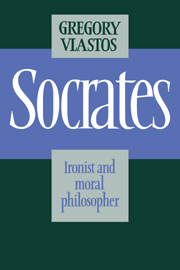Book contents
- Frontmatter
- Contents
- List of additional notes
- Introduction
- 1 Socratic irony
- 2 Socrates contra Socrates in Plato
- 3 The evidence of Aristotle and Xenophon
- 4 Elenchus and mathematics
- 5 Does Socrates cheat?
- 6 Socratic piety
- 7 Socrates' rejection of retaliation
- 8 Happiness and virtue in Socrates' moral theory
- Epilogue: Felix Socrates
- Additional notes
- Bibliography
- Index of passages cited
- Index of names in Plato and Xenophon
- Index of modern scholars
- Index of Greek words
- Frontmatter
- Contents
- List of additional notes
- Introduction
- 1 Socratic irony
- 2 Socrates contra Socrates in Plato
- 3 The evidence of Aristotle and Xenophon
- 4 Elenchus and mathematics
- 5 Does Socrates cheat?
- 6 Socratic piety
- 7 Socrates' rejection of retaliation
- 8 Happiness and virtue in Socrates' moral theory
- Epilogue: Felix Socrates
- Additional notes
- Bibliography
- Index of passages cited
- Index of names in Plato and Xenophon
- Index of modern scholars
- Index of Greek words
Summary
Socrates' commitment to reasoned argument as the final arbiter of claims to truth in the moral domain is evident throughout Plato's Socratic dialogues. He refers to it in the deliberation by which he justifies to Crito the decision to remain in prison and await execution:
tiCr. 45B: “Not now for the first time, but always, I am the sort of man who is persuaded by nothing in me except the proposition which appears to me to be the best when I reason (λογιομένῳ) about it.”
And yet he is also committed to obeying commands reaching him through supernatural channels. When explaining at his trial why the state's power of life and death over him could not scare him into abandoning the public practice of his philosophy, he declares:
T2 Ap. 33c: “To do this has been commanded me, as I maintain, by the god through divinations and through dreams and every other means through which divine apportionment has ever commanded anyone to do anything.”
Between these two commitments – on one hand, to follow argument wherever it may lead; on the other, to obey divine commands conveyed to him through supernatural channels – he sees no conflict. He assumes they are in perfect harmony. Can sense be made of this? I want to argue that it can.
- Type
- Chapter
- Information
- SocratesIronist and Moral Philosopher, pp. 157 - 178Publisher: Cambridge University PressPrint publication year: 1991
- 2
- Cited by



